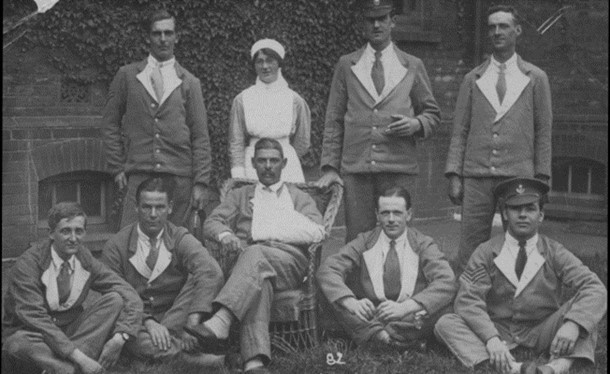03 November 2018
Heroic Newfoundland nurse remembered 100 years on

The Commonwealth War Graves Commission is remembering her and others who fell in the final stages of the conflict as part of its Road to Peace campaign which is shining a light on 120 human stories behind some of the war casualties who fell in the closing days of the First World War.
Bertha Bartlett was born in 1894, in Newfoundland to Mary and Robert Bartlett. At that time Newfoundland was a self-governing dominion within the British Empire but today is part of Canada. In 1916, aged 21, Bertha volunteered to serve overseas with the Canadian Military Voluntary Aid Detachment.
Voluntary Aid Detachment was civilian organisation established by the British Red Cross and Order of St John to provide military nursing, patient care and support to the armed forces of Britain and the Empire. Known as ‘VADs’, the volunteers were generally young women of middle or upper-class background, and who worked as cooks, laundresses, maids, clerks, drivers and nurses.
VAD’s played an important role during the war, supporting the armed forces by staffing military and auxiliary hospitals, helping to care for sick and wounded servicemen in the home countries, in France and Belgium but also further afield in Egypt, Malta, Iraq, Salonika and Serbia. Over 80,000 people served with the VAD during the First World War.
Bertha arrived in England in December 1916 and was posted to the 4th Northern General Hospital in Lincoln. The hospital occupied the old buildings and fields of the former Lincoln Grammar School. After a few months, she was posted to The Bermondsey institution in London, one of many hospitals set up in London to care for the wounded. Bertha soon proved herself a capable nurse, working at the height of the Spanish Flu Pandemic in 1918.
She cared for many sufferers of the disease, which in total killed between 50-100 million people worldwide. While caring for her patients, she contracted the illness herself and died on the 3rd November 1918, only 11 days before her 24th birthday.
Bertha was laid to rest in Wandsworth (Earlsfield) Cemetery, London. She is buried alongside seventeen other service personnel from Newfoundland. Upon her headstone are inscribed the words, ‘She died for those she loved’.
The Road to Peace Project aims to illustrate the global nature of sacrifice of the First World War. From famous casualties like war poet Wilfred Owen, through to relatively unknown individuals; from those dying in battle to those who died of Spanish Flu; each story has been carefully chosen to shine a light on the human stories on the costly Road to Peace.
CWGC Historian, Max Dutton, explained: “Behind every one of our headstones or names on a memorial to the missing, is a human story just waiting to be told. Our 100 days “Road to Peace” campaign will remind people of the human cost of the Great War, the sheer diversity of those who took part and the global nature of that sacrifice and remembrance today. We hope Bertha’s story will inspire people to find out more about her and her fellow comrades commemorated by the CWGC and visit their graves and memorials.”
From 8 August – the 100th anniversary of the Allied victory at the Battle of Amiens – the “Road to Peace” campaign will conclude on 11 November with the stories of 11 people who died on the very last day of the First World War, even as the guns fell silent. The “100 Days” is a term applied to the final period of the First World War, during which the Allies launched a series of offensives on the Western Front that ultimately led to peace. Not actually 100 calendar days, the term is a reference to the final period of the Napoleonic Wars. The Road to Peace stories will be shared across the CWGC’s digital channels on Facebook, Twitter and Instagram. A story will appear every day – with a more in-depth feature appearing weekly.

